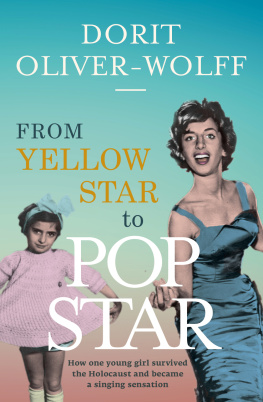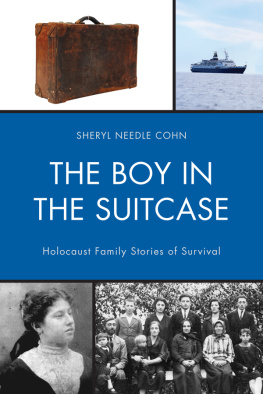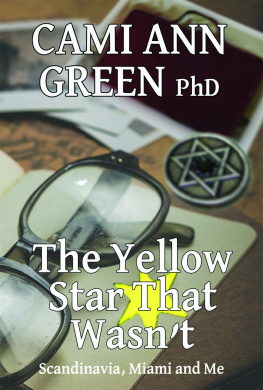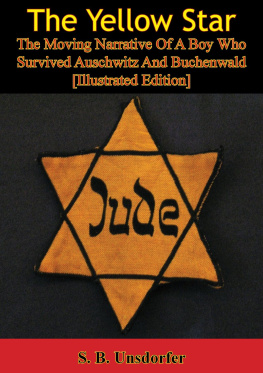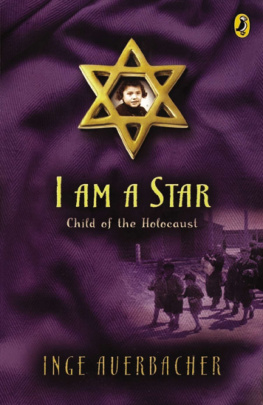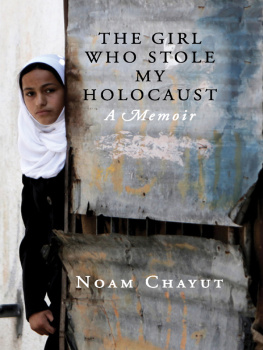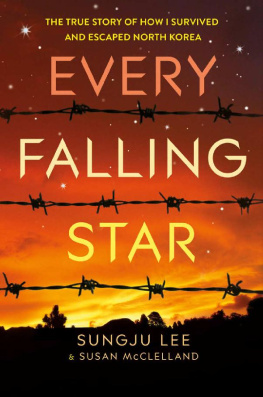FROM YELLOW STAR TO POP STAR
FROM YELLOW STAR TO
POP STAR
DORIT OLVER-WOLFF

Published by RedDoor
www.reddoorpublishing.com
2015 Dorit Oliver-Wolff
The right of Dorit Oliver-Wolff to be identified as author of this Work has been asserted by him/her in accordance with sections 77 and 78 of the Copyright, Designs and Patents Act 1988
ISBN 978-1-783017-36-2
All rights reserved. No part of this publication may be reproduced, stored in a retrieval system, copied in any form or by any means or otherwise transmitted without written permission from the author
A CIP catalogue record for this book is available from the British Library
Cover design: Rawshock design
Typesetting: www.typesetter.org.uk
Writing this book caused me to re-live my early life, a mixture of extreme pain and great joy. I dedicate it to my family.
CONTENTS
AUTHOR NOTE
I am a Holocaust survivor and international recording artist. I am an author and experienced public speaker. My talks are not a historical account of events, but focus on my experiences of the Holocaust, seen through the eyes of a five-year-old Jewish girl, and my life beyond that. I survived against all the odds.
My talks are educational, inspiring (hopefully), at times unbelievable, sometimes funny, and they are suitable for people of all ages! I give my talks at schools, colleges, hotel venues, literary gatherings, ladies luncheons, educational conferences any venue where people wish to hear about my true life account, that of a Holocaust survivor.
My passion is to build bridges between different religions. I am convinced that if people would listen to each other and compare their similarities rather than their differences, nations would learn to get along far better. Nobody has the right to persecute or kill others for being a different religion, race, creed or colour. Everybody has the same right for living and for life. Its not that I want to remember the Holocaust, but I simply cannot forget. This is part of my story. These are my memories.
FOREWORD
This book is a song of survival and success. It deals in resilience and resourcefulness on a grand scale. It traces the authors life through times of persecution, fright, rebuilding, international singing success and betrayal. At every stage the authors intelligence and quick-wittedness shine like the searchlights she used to evade; like the spotlights she later sang beneath.
Dorit Oliver-Wolff is Jewish by birth. For her, Jewishness is a thing neither to defend nor celebrate. It is just fact. To Dorit, many things are, and always were, more important than her racial identity. In wartime Europe, others felt differently. In the later stages of World War II, Jews were rounded up on an industrial scale and transported from their homelands to camps in Germany and Poland. From Hungary, where Dorit lived in hiding with her mother until the Russian liberation, almost two thirds of the Jewish population of some 725,000 was transported in the early months of 1944 to Auschwitz II-Birkenau. The vast majority perished. Dorit and her remarkable mother, through a mix of bravery, guile, ingenuity, intelligence and luck, evaded capture. They survived the Holocaust. But their troubles were far from over.
After having survived in Budapest on scraps of food stolen or begged for, and having lived in a series of safe houses, consulates or convents, Dorits mother took herself and her vulnerable charges to Novi Sad in what is now Serbia (then part of Yugoslavia), where the Communist regime had newly occupied the political void. They were behind the Iron Curtain where life remained difficult, especially for Jews. It was not long before Dorits resolute mother arranged for them to emigrate from Yugoslavia to Israel under the bilateral treaty for ethnic migration.
Although Dorit had received a music scholarship in Yugoslavia, it was in Israel that her formal education really began. It was a place where she felt at peace but not a place where she was destined to remain. Her mother (by now remarried) took the family to Turkey. It was under her mothers tutelage that Dorit learned to dance. She became a member of her mothers dance troupe and toured throughout Turkey, Greece and Cyprus, not only dancing but also taking on singing solos. Her encounters with entertainers, showgirls, prostitutes and pimps provided great life-experience for a young teenager. It was in Cyprus that Dorit married and gained British citizenship: a decision that was to have a profound effect on the course of her life.
There followed years of singing, touring, recording, increasing fame and of motherhood. Dorit became sought after for singing engagements in Monte Carlo and Nice as well as throughout her adopted home country of Germany. Eventually, she was betrayed by those closest to her and lost almost everything. She kept possession only of her daughter. And then they found Frank.
When Dorit asked me to help with her book, I expressed some concerns. I was aware that the early drafts had been dictated and that Dorits first language was not English; I feared the task would be all consuming. However, after agreeing to read the first three chapters there was no going back: I was captivated. It was immediately clear that her skill as a narrator would do justice to her remarkable story. Dorits fluency in several European languages helps to create a writing voice and style which brings to life the nomadic existence of her early years.
This book traces the authors experiences of deepest hatred and unexpected compassion; her encounters with new languages, cultures and customs. It charts her journey from Holocaust survivor to educated young woman and highly talented singer, performing throughout Europe and making successful records with celebrated musicians. Most of us know of people who have survived difficult times only to come through stronger. But the mountainous scale of Dorit Oliver-Wolffs lows and highs leaves one in awe.
Michael J Fleming
THE CONCERT
I could hear the compre announcing my name. The orchestra struck up my signature tune and even before I appeared on the stage, there was a standing ovation. All sorts of feelings flashed through my mind. Was I not that little Jewish girl who used to break out into a cold sweat and hide at the sight of a German soldier in uniform?
This concert in Bremerhaven was, for me, the most emotional and strange show business experience. The annual Dinner Dance was a spectacular event for the German air force. The organisers had insisted I should sing at this gala evening. It was a very special occasion. The ladies were in beautiful ball gowns and the gentlemen had on their best greyish blue uniforms. Many were wearing their medals. Some had so many they almost covered the left side of their jackets.
The seats were all taken, with the higher-ranking officers being seated in the first and second rows. The auditorium was decorated with the most amazing flower arrangements. When I arrived, I had walked the red carpet leading from the pavement where the chauffeur-driven limousines would stop at the entrance. I had never seen so much pomp and glitter before.
It was not surprising that the sight of so many German uniforms brought up a strange feeling inside of me, especially when the house lights were switched off and only the spotlight and footlights came on. I suddenly felt panic. Why had they insisted I should be the one who should entertain them? Why me?
Although I had hesitated I could not refuse this engagement. This would not have been professional. The fact that these were men in German uniforms spooked me. The memories just overwhelmed me. Here I was, standing on stage and the men in uniform were applauding me. I felt a lump in my throat. For a moment I could not move. I did not think I could sing. My smile must have looked like a mask. Suddenly my mood changed. I had this immense feeling of triumph.
Next page
